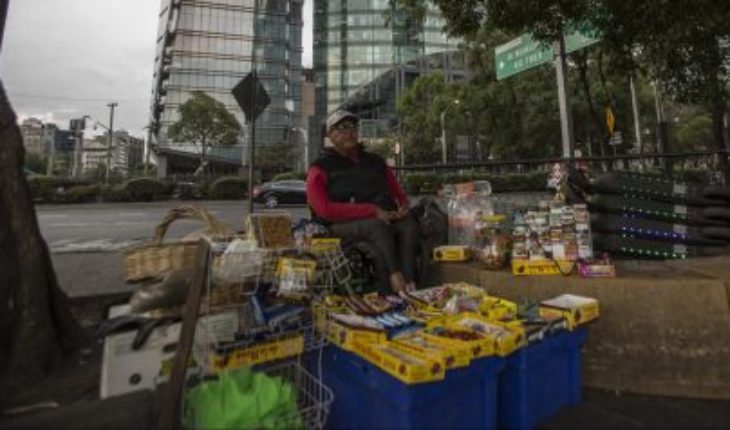Mr. Jorge Alvarado walks down one of the corridors of Mexico City’s Pantitlán metro, which at 7.30am on Wednesday, March 18, is an amorphous mass of people who run nervously to take some of the four lines that are concentrated at this point heading towards the Mexican capital.
Dressed in a red sweater and denim trousers, the man, who pulls a devil in which he carries several packages with plates, watches and other products, says that in the early morning he heard on the radio that they already add up to more than 100 cases in Mexico of COVID-19, the virus that has spread around the world to become a pandemic and one of the greatest challenges of modern humanity.
“Of course I’m afraid of the coronavirus,” admits, 77-year-old. But, actually, I’m more afraid to starve to death. Because if I don’t go to work, I don’t eat today.”
Read: COVID-19, Dollar Rise, Stock Market Crash: How They Affect Me and How I Protect
Jorge then walks through the workers and merchants who walk in the row down the aisle to a platform that is already crowded – many arrived from La Paz, in the neighboring state of Mexico – and explains that despite his advanced age he also has to climb the subway very early to go to the tianguis of Mexico City to sell his goods, or at least to try.
And it has to, even, even if business goes wrong, as in this week in which the decline of clientele in the markets and on the streets of the city by coronavirus is already noticeable.
So the trader looks at the packages he carries in the devil, shrugs, and says that missing a single day to his “chamba” is not an option for him.
He does not even, he insists, because of the threat of a pandemic which, in multiple countries of the world, such as Spain, France or Italy, has already forced millions of people to remain locked up in their homes.
“If I had to quarantine him, I would go in. But then who’s going to feed me? I live up to date, like most of you see here,” he says with his eyes on the platform, where people wait for the convoy to leave with backpacks on the shoulder, some mouthcovers, and many sleep faces and yawns.
Read: Empty tables: Coronavirus threatens small restaurants in the CDMX
“Yesterday I spent in the supermarket to buy the food all week and if I don’t work today, what do I do? How do I pay for the electricity, the property, the food? -question with a frown. I wouldn’t be enough to live, I’ve got to work anyway.”
In another corridor, in one of the countless in this station of Pantitlán, a concrete labyrinth and walls painted of a depressing gray ash through which more than 130 thousand people pass daily, Mrs. Delfina Martínez walks with difficulty carrying a cumbersome cardboard box to the shoulder.
Questioned whether she could stop working for the coronavirus, or whether she could work from home until she passes the contingency, the 55-year-old lady gives for a response a fatigued smile.
Nor can he afford that, he answers after a brief silence. Neither she, nor the more than 30 million people who, according to INEGI data from 2019, work in informality in Mexico, especially in street commerce, food stalls, jobs in the field, or in tasks as a domestic employee.
“If I do not work, not like me, nor do I eat my children,” the woman sentences, in what already seems like the motto of those who crowd Pantitlán on Wednesday morning, who agree that in the informality sector there is a very different reality from that of the Paseo de la Reforma, in the economic heart of the Mexican capital, or other points with a strong presence of multinational companies, such as Santa Fe.
Read: Mexico records first death by COVID-19; the man had symptoms after going to a concert
There “is another Mexico,” says Nieves Navarrete, as if Reforma were a far away place in space, and not an avenue located a few miles away.
And, actually, Snow, 55, doesn’t exaggerate.
For her, the working conditions, wages, and benefits of those who work in corporate towers, in international banks, or in embassies, which have already sent much of their workforce to work from home until the coronavirus pandemic comes to life, are science fiction.
“We domestic workers can’t miss because no one protects us. We can’t afford that. We have to go to work every day, no matter what,” Snow adds with his breath choppy as he climbs a few stairs, dodging several sad-looking elders holding in their hands some packs of gum they offer for a few coins.
Anselmo Salgado, 68, is one of those sad-faced older adults, although he works as a cleaner. Holding on to a broom, Anselmo says in a torn, somewhat honed voice that, on days like today, he has to double turn to get some extra money that allows you some more food on the plate.
Anselmo has also heard of coronavirus, although one more virus, one more catastrophe, says it no longer makes much difference to it. Hence, he also does not contemplate the possibility of sparking at some point for the coronavirus.
Reads: Enrique Alfaro warns about 400 people who returned to Jalisco from the US and could have COVID-19
“If the authorities told me I had to stop, I wouldn’t be able to do it. Because what would he live on then?” asks the man, who wears a worn black jacket and a wool scarf to protect his throat from the cold of the capital morning.
Gustavo Martínez, on the other hand, does work in the formal sector. In fact, he counts while he waits with his backpack on his shoulder, he has been given Chance to do home office these days. Or well, halfway. Actually, you are taking turns with other colleagues to go to the office one day and another work from home, to avoid crowds.
Still, working remotely several days a week is a relief, he says. Above all, due to the uncertainty of what the scope of the coronavirus will be in Mexico, where so far just over 100 confirmed cases go; a figure, however, that is light years away from what they are suffering in other countries such as Spain, where they total more than 11,000 cases.
However, implementing severe containment measures for the virus, such as confinement in the homes of millions of people, under threat of being fined by the police or the army, as is happening in Spain, Italy or France, is going to be a very complicated thing to do in Mexico, Gustavo says. Not to mention impossible, as much or more as to imagine one day the platforms of this station completely empty of people who were sheltered in their house until further notice.
“You can’t contain these people. Imagine, how would they do it? They’re people who, if they don’t work, don’t eat literally that day. It would be impossible to stop,” says Gustavo, who, for now, believes that the only alternative to prevent massive coronavirus infection is to “respect the hygiene indications” that the federal government makes on a daily basis.
Like canned sardines
Although, even in that, the reality that is lived in this underground micro cosmos of platforms, walls, and concrete trabes, is also different.
Down here, there are also posters everywhere with illustrative photographs explaining to people how to wash their hands, wave with their elbows, or not touch their faces; health authorities routinely repeat at morning and evening conferences to prevent contagion.
But on the subway, no one meets another of the key safety indications: to keep “a healthy distance” of two meters between people.
Read: Why People Buy Bathroom Paper In the COVID-19 Pandemic
And no one meets it, for a simple reason: it is impossible to fulfill it, until on days like this Wednesday, when the influx of passengers is a little lower than the daily, due to the temporary closure of some companies and corporate companies in Mexico City by the Covid-19.
But still, when the door of one of the convoys arriving in Pantitlán from La Paz, State of Mexico opens at eight o’clock in the morning, a huge number of people go out to push each other, to gain a space on the steep concrete stairs that will take them to another platform and another convoy where they will continue the journey to the big city.
“There is no way the distance the government tells us,” admits Mr. José Alvarado, who is still waiting with his devil for the next metro to pass.
“I wish we could go further apart, but you see: here that’s impossible. That’s why we travel every day like canned sardines. All together and tight,” the trader laments with a resigned smile.
What we do in Animal Político requires professional journalists, teamwork, dialogue with readers and something very important: independence. You can help us keep going. Be part of the team.
Subscribe to Animal Politician, receive benefits and support free journalism.#YoSoyAnimal
translated from Spanish: ‘I’m afraid of coronavirus, but I’m more afraid of starving if I don’t work’
March 19, 2020 |





